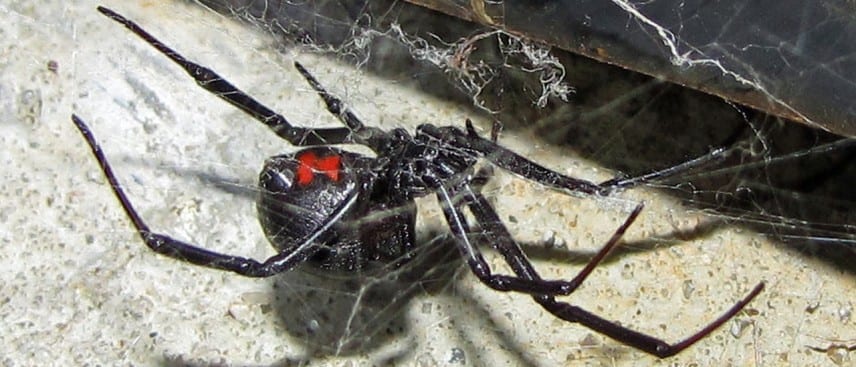There are very few things in nature that are imbued with the same sublime sense of awe as the black widow spider. It’s deadly, it’s unassuming, and while it’s hard to say it’s beautiful, it does have a certain aesthetic quality to it. Black widow spiders are generally visualized as jet black with a characteristic red marking on their backs. Most people know that much. But can you pass our black widow spider fun fact quiz? Let’s find out!
#1. The black widow spider is so named because:
- The females will consume their mates
- Their venom is deadly
- There are no males
- They’re literally black
Answer: (B) Black widow females do consume their mates on occasion but not as often as you might think. Since the fact that they consume their mates is fairly repugnant to human sensibilities, they have been (perhaps unfairly) associated with that habit. It’s true that females will devour males after sex, but males are savvy enough to know what’s coming and usually try to get away as soon as their business is done. In lab settings, however, the male has nowhere to run.
When a male approaches a potential mate, he does a cute little courtship dance on her web so that she doesn’t confuse him with food. Then they make out and he runs away.
#2. Why do scientists believe black widows are migrating north?
- Urbanization
- Deforestation
- Climate Change
- Predator invasion
Answer: (C) Black widows are believed to be migrating north because of climate change. At least according to one study which has tracked the black widow as far north as Canada and climbing.
#3. How long does black widow venom take to kill you?
- One hour
- Four hours
- Eight hours
- Black widow venom is not fatal
Answer: (D) It’s extremely rare for a human to die from black widow venom. Their reputation comes from the fact that their venom is 15 times more poisonous than even rattlesnakes. However, it doesn’t require a lot of venom to take out a beetle or an ant. When humans do die from black widow stings, it’s generally because they are either very young or very old. In some cases, those with other serious illnesses are more susceptible to bites as well.



- High pitched sounds outside human audio perception
- Pheromones
- Telepathy
- Using facial cues
Answer: (B) Just like insects, arachnids can communicate with each other using either pheromones or vibrations. Female black widows put pheromones in their silk that serve the same function as a Tinder profile.
#5. Which species is the greatest threat to black widow spiders?
- Humans
- Wasps
- Praying mantises
- Birds
Answer: (C) Humans may be a threat to black widows, but praying mantises eat them for food. So do wasps, for that matter, but praying mantises do much more frequently. While black widows are cannibals and will consume their young, adult black widows need to be more wary of praying mantises than any other species in the wild.
#6. What is a baby black widow spider’s favorite meal?
- Ants
- Termites
- Dead bugs
- Other baby spiders
Answer: (D) Baby black widows engorge themselves on their brothers and sisters during their formative years. In actuality, their formative years take about 3 months until they are full adults. The mother will lay an egg sac containing around 200 to 900 babies. When they hatch, it’s the survival of the fittest. A handful are left remaining.
#7. How long can a black widow spider live?
- One year
- Three years
- Six years
- Ten years
Answer: (B) Black widows have been known to live up to three years in captivity and under ideal circumstances. In the wild, however, most won’t make it past three months.
#8. What are common symptoms of a black widow spider bite?
- Fever, chills, and nausea
- Muscle cramps, spasms, pain, nausea
- Respiratory distress, faintness, and confusion
- Sudden painful death
Answer: (B) Black widows emit a neurotoxin known as Latrodectus the strongest of which is known as alpha-Latrodectus. The toxin interferes with your brain’s ability to send signals to your muscles causing cramps, spasms, and pain. It also causes nausea.
#9. Should I be worried if I see a black widow spider?
- Yes, freak out immediately
- No, remain calm
Answer: (B) Black widows are completely indifferent to your existence. If they feel harassed or threatened by you, they might bite, but usually don’t. Most of the time they will play dead or run away. Even though there are a lot of black widows out there, there are only around 1400 reported bite cases per year. Hospitals have antivenom on hand, but most patients won’t need it. Their symptoms will clear up after 12 hours.
Do you have more questions about black widows or other spiders in the area? Don’t hesitate to reach out to Pointe Pest Control for immediate assistance. Our spider control experts serve clients in Pennsylvania, New Jersey, and Delaware, and we are eager to help you today.


